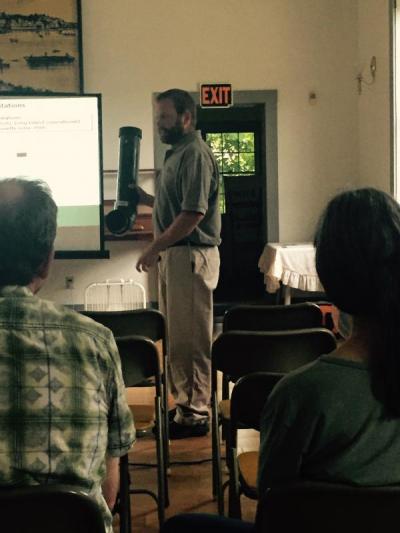Federal program has rabies on the run in Wareham
Wareham is on the front lines in the fight against rabies.
This spring, the U.S. Department of Agriculture, alongside the Cape Cod Rabies Task Force, expanded a program that combats a strain of rabies harbored by raccoons. Rabies is now being fought in Wareham, Plymouth, Middleboro and parts of the tri-town.
On Tuesday night, federal officials explained that the program’s goal is to create a 30-mile buffer zone extending west from the Cape Cod Canal that is free of the deadly virus.
Brian Bjorklund, a wildlife/rabies biologist with the USDA, explained aspects of the local program as well as similar efforts across the country. The event was free to the public and hosted by the Wareham Land Trust.
The rabies virus is carried in the saliva of infected animals. It spreads when an infected animal bites or comes in close contact with a human or another animal. The virus infects the central nervous system, ultimately causing an inflammation of the brain and then death.
The disease is treatable if a vaccine is administered soon after being exposed.
In the Northeast, Bjorklund said the virus thrives in raccoons, but it can be transmitted via foxes, skunks, possums and bats.
The problem, Bjorklund said, is that raccoons are “ecological generalists,” meaning they thrive in a variety of habitats.
“Where human populations are very high, the raccoon population is very high,” he said. “That’s the problem we’re battling.”
He said there will be a heavy concentration of vaccines placed in Onset to help prevent the spread of the disease there.
Regarding Wareham, Bjorklund said he wasn’t aware of an infected animal attacking a human. In Buzzards Bay, he said there were one or two attacks recorded recently.
While statistics aren’t kept on how many animals tested positively for rabies specifically in town, the Massachusetts Department of Public Health reports that last year seven animals were found with the virus in Plymouth County out of 230 tested.
Bjorklund said people should be on the look out for the vaccinations and take precautions to keep pets from taking the bait.
The vaccines won’t harm pets if ingested, but they are considered a lost dose for wildlife. The vaccines are inside plastic packets, which are wrapped inside bait made up of fishmeal.
The first official case of rabies in the state was reported in 1994. Ten years later, Cape Cod had its first official case. As for how the disease crossed the canal, Bjorklund said there a few theories. A raccoon may have walked across one of the bridges or perhaps an animal hitched a ride on the trash train.
To combat the disease, Bjorklund said vaccinations disguised as edible treats were planted across the Cape. The program has been a success and moving forward, Bjorklund said, 72,000 vaccinations will be planted in bait stations and dropped by hand in the area.
















